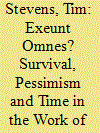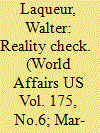| Srl | Item |
| 1 |
ID:
159791


|
|
|
|
|
| Summary/Abstract |
John H. Herz (1908-2005) is better known for his theorisation of the security dilemma than for his conviction that human survival is threatened by the conditions of late modernity. This article explores extinction and survival in his work to interrogate his persistent characterisation as an incorrigible pessimist. In his preoccupation with extinction, Herz would seem a first-rank pessimist, but his intellectual commitments belie this easy categorisation. Specifically, his appeals to interdisciplinary ‘survival research’ suggest a qualified pessimism that does not foreclose on the potential of humankind to overcome structural, political and normative obstacles. This is consistent with current understandings of pessimism within the broader realist tradition. Herz expressed an ‘open’ and ‘linear’ temporality that challenges cyclical and linear-progressive temporalities inherent to realism and liberalism, respectively. Herz articulates, therefore, a ‘productive pessimism’ that charts a different path for pessimist thought beyond its pejorative connotations. This article contributes to the literature on classical realism, to a growing interest in Herz’s intellectual legacy, and to the developing appreciation of time and temporality in International Relations theory and practice. It also provides a foundation for rethinking our assumptions about pessimism and international politics.
|
|
|
|
|
|
|
|
|
|
|
|
|
|
|
|
| 2 |
ID:
152067


|
|
|
|
|
| Summary/Abstract |
The claim that the spread of nuclear weapons leads to interstate conflict and nuclear war has become very influential. However, proliferation pessimists have failed to specify how and when nuclear proliferation precipitates conflict. I make four arguments for an optimistic pessimism. (1) The few preventive strikes against nuclear facilities that have occurred would have occurred absent of the target's nuclear program, and these rare strikes did not lead to conflict escalation. (2) The problem of nonsurvivable arsenals is, properly understood, a problem of preventive-war motivations where subjective uncertainty reduces the dangers of arsenal survivability. (3) Claims that bias within nuclear organizations may lead to accidental nuclear detonations suffer from omitted variable bias: leaders' decisions to revise the status quo after developing nuclear weapons tend to give rise to the most dangerous nuclear accidents. Accidents that have not occurred during a nuclear crisis pose substantially less risk of nuclear escalation. (4) Leaders of nuclear states have tended to engage in conventional aggression, but experience with nuclear weapons moderates their conflict propensity. Ultimately, I argue that while nuclear weapons have led to conflict through one causal mechanism and for a limited time, the dangers are substantially weaker than usually assumed.
|
|
|
|
|
|
|
|
|
|
|
|
|
|
|
|
| 3 |
ID:
168706


|
|
|
| 4 |
ID:
125208


|
|
|
|
|
| Publication |
2013.
|
| Summary/Abstract |
Psychological factors have always played a decisive role in the assessment of political trends. Yet until recently they have not been analyzed. Now neuroscientists (rather than political scientists) are talking about optimism and pessimism bias. According to their findings, most people tend to see the political glass as at least half full. As Tali Sharot writes in her recent book The Optimism Bias, "A growing body of scientific evidence points to the conclusion that optimism may be hardwired to the human brain." Another school of cognitive scientists sees the main danger in being too much influenced by negative conclusions when faced by ambiguous social and political situations. In the words of a recent issue of American Scientist devoted to the subject of optimism and pessimism, "A negative bias can construct a more hostile worldview than if a person's focus tends to lands of friendly faces."
|
|
|
|
|
|
|
|
|
|
|
|
|
|
|
|
| 5 |
ID:
181942


|
|
|
|
|
| Summary/Abstract |
The field of international relations has been described as a discipline rooted in pessimism. This stems from misunderstanding optimism and from downplaying the negative consequences of pessimism. Insights from the psychological literature on optimism challenge these assumptions. In particular, the optimism-pessimism binary needs to be broken down and optimism seen as a healthy middle state between overconfident risk-taking and debilitating pessimism. There are proven techniques that could be used by those working in international relations to promote an optimistic outlook to help avoid falling into despondency. The field will limit the ability of its scholars, practitioners and students to contribute to solving problems if it ties itself to pessimism.
|
|
|
|
|
|
|
|
|
|
|
|
|
|
|
|